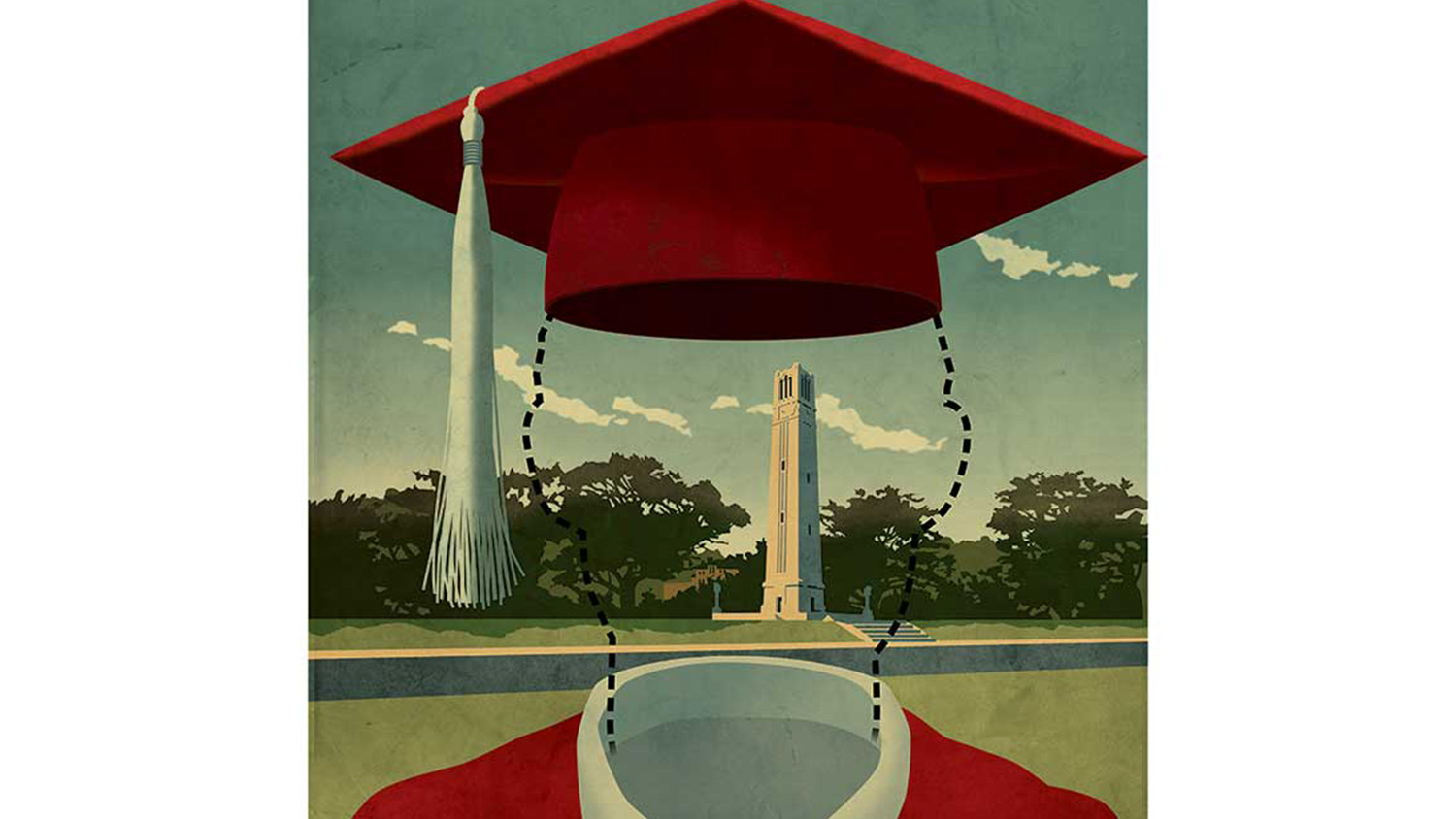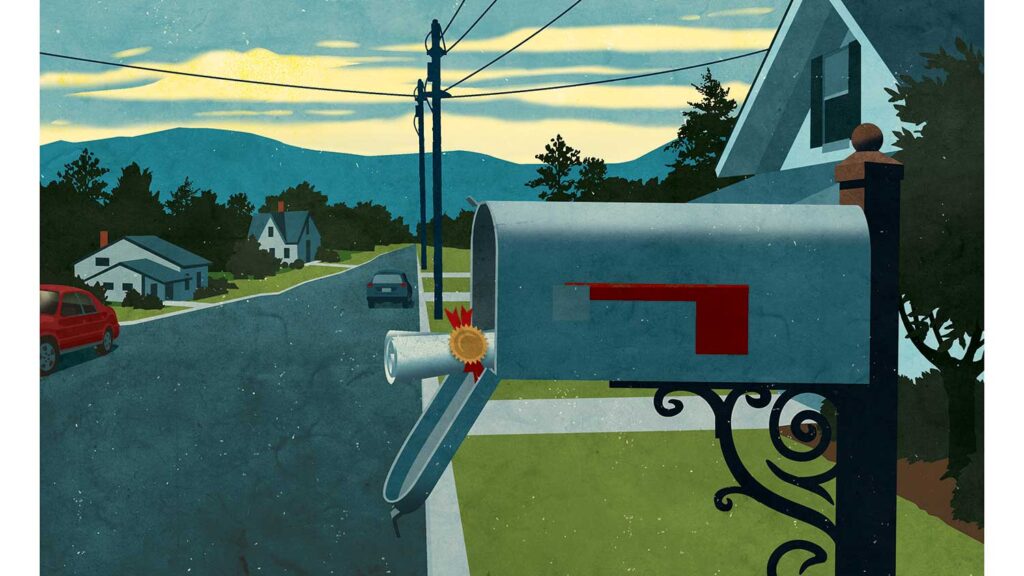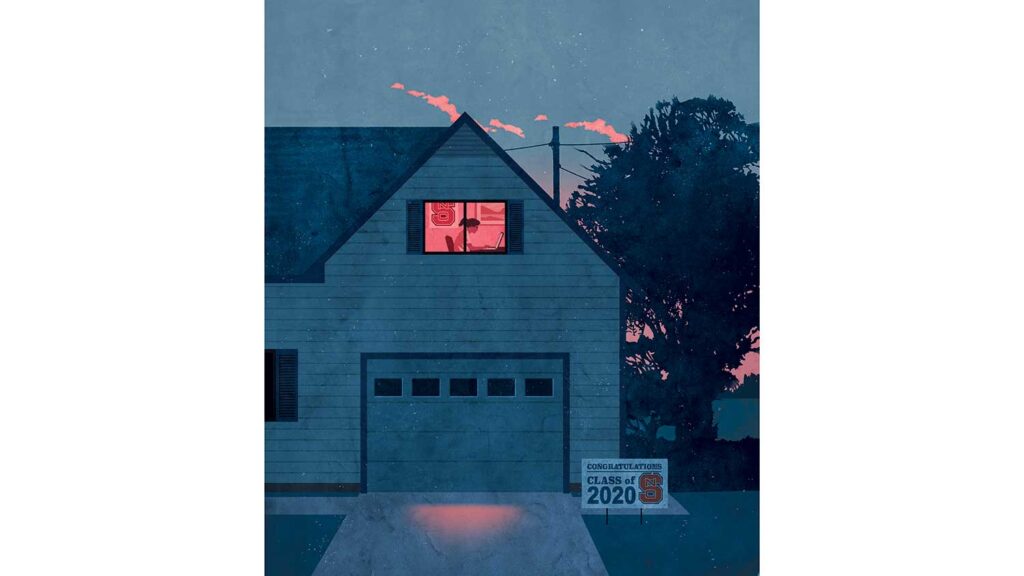Missing Out
The Class of 2020 didn’t get to experience some important rites of passage, from final hugs with friends to a farewell stroll across campus, in their last semester as students. Illustrations by Sam Ward.

The Class of 2020 didn’t get a chance to say goodbye. There were no farewell hugs. No final strolls across the Court of North Carolina or the Brickyard. And, of course, no chance to hear the applause as they walked across the stage in their caps and gowns.
They lost their last semester of college.
The nearly 6,000 members of the Class of 2020 were denied an important rite of passage, the sudden shift from being a student to being an adult. It was taken away with no warning in March, when the rapidly spreading coronavirus pandemic forced university classes to be shifted online while students were away on spring break. The move, by NC State and universities around the globe, effectively shut down the campus before graduating seniors could take stock of their past four years at NC State.
“I feel like you need those last few weeks,” said Melanie Hardee ’20, a biological sciences major from Benson, N.C. “It’s kind of crucial for your closure, stepping into the next part of life. It really does bother me. I wish I could just lay in the grass at the Court of [North] Carolina. I wish I could just say goodbye to the staff at Biological Sciences, eat at the Atrium one last time. I wish I could steal a brick. I never did that. I wanted to go to a baseball game.”
A Million Little Things
Mindy Sopher has worked at NC State in various capacities for more than two decades, and is now a lecturer in the Department of Communication. She’s also something of a graduation groupie, someone who volunteers to serve on commencement committees and who gets “all goose-bumpy” talking about the joy she gets from the occasion. “It’s important to me because it’s important to them,” she said. “It’s a significant marker of maturity and achievement.”
But, Sopher pointed out, it’s not just about missing out on graduation for the Class of 2020. “It’s that last meal at The Players’ Retreat together,” she said. “Or the last beer at Mitch’s. It’s the last happy hour at the place next to Bruegger’s. It’s a lot of scheduling time with people, that last trip to the Wolf Ears. They have to take a picture in carrel number 17 on the fifth floor of the library. They go talk to the lunch lady or to a professor or a lab assistant. One guy told me he went around and talked to the custodian in his dorm. They both spoke Spanish, and she gave him hope every morning.
“It’s a million little things.”
There are also some big things, like getting started on a career. Russell Gorga, an Alumni Distinguished Undergraduate Professor and director of undergraduate programs in the Wilson College of Textiles, teaches an intensive design class that gives seniors a chance to work on “real world” projects for companies such as Patagonia and Adidas. So he has seen the despair and confusion that has hit this group of graduates, some of whom have had job offers rescinded because of the pandemic. Many are finding it difficult to get job interviews, much less actual jobs.
“At first, I was kind of devastated, really upset. It didn’t seem fair. Then I realized, there’s no one to blame for it. Things happen.”
–Melanie Hardee ’20 biological sciences major, Benson, N.C.
“The real slap in the face is that a lot of really great students are basically in limbo right now,” Gorga said. “They have this fear of, ‘What am I going to do now? How am I going to start my life and career?’ ”
Rupert Nacoste, an Alumni Distinguished Undergraduate Professor of psychology, said that loss could have a lasting impact. “As social beings, we need social events to tell us where we are in life,” he says. “Without those social events, it’s not just a disappointment. It’s an ambiguity about life. This is, for them, a defining moment.”
The Last of Everything
Many seniors said they hated to miss graduation, which the university intends to reschedule, while others admitted they had planned to go only to please their parents. Most were looking forward to the smaller, more personal, departmental graduation ceremonies. It was there that they could thank their professors and take pictures with the friends they had worked with in study groups. And everyone had their own lists of what they were missing: Hanging out on Tucker Beach. Walking through the Free Expression Tunnel. Eating the Boom Boom chicken wraps at Case Dining Hall. Ambling through the garden by Withers Hall.
“I think I’m just going to miss the last of everything,” says Isabelle Rocco ’20, a communications major from Charlotte, N.C.
Like many seniors, Jack Kiker ’20, a mechanical engineering major from Monroe, N.C., spent his last weeks of college taking online classes at his family’s home. He missed the convenience of Carmichael Gym and the proximity to campus of fast-food spots like Zaxby’s and Cook Out. “A tray with a burger, a quesadilla and fries — and a caramel cheesecake shake,” he said. “That was my favorite.” He even felt wistful about his late-night study session before tests. “It’s a little sad,” he said, “that I won’t be in Hunt [Library] doing anything again.”

Rachel Bland ’20, an elementary education major from rural Sampson County, N.C., had strong connections with the campus groups she was involved with. Bland was spending her last semester as a student teacher at West Clayton Elementary School. She’s also a Goodnight Scholar, and looked forward to Wednesday nights in the Goodnight lounge in Peele Hall. Or, as they call it, M&M Wednesday. That’s when the staff would set out two flavors of M&Ms each week for the students to enjoy while they studied. “I haven’t had M&Ms from the Goodnight lounge since March 4,” Bland said. “I love the peanut butter ones. We had a suggestion to have a virtual lounge, but it’s not the same.”
“I really enjoy just walking around campus and seeing people that I know, just those little interactions that I might have taken for granted. The opportunity to hug a friend or talk to someone in person, those things that you never thought would be taken away.”
–Anna Scott Wingfield ’20 biology major, Nashville, N.C.
The move to online classes created unique challenges for some seniors. Heading into spring break, Kori Hyer ’20 was putting the finishing touches on her senior project as a fashion and textile design major — a collection of apparel that she had designed. Her work would be unveiled at a fashion show in the Talley Student Union at the end of the semester, a show that Hyer had gone to the three previous years as a volunteer worker or a guest. But the pandemic meant there would be no show.
“Your entire four years is built up to this fashion show at the end,” said Hyer, who is from Fayetteville, N.C. “You picture yourself being there, so it’s a big disappointment that I won’t have that experience. But I’m trying not to dwell on it. I’m trying to let myself still be excited about things.”
The Graduates
6,192
Undergraduate degrees awarded (the most ever)
5,825
Graduating seniors (some got more than one degree)
846
First-generation graduates
4,676
In-state graduates
448
Out-of-state graduates
701
International graduates
74
Oldest graduate
19
Youngest graduate
619
Legacy graduates
2,973
Male graduates
2,852
Female graduates
Pushed Off a Cliff
The void felt greater, perhaps, because graduating seniors had little warning it was coming. They went into spring break aware of the coronavirus, but were focused on getting to a sunny beach in Florida or taking an alternative service break with other students to help the homeless in places like San Francisco, Calif., or work on projects in countries around the world. Some planned to spend the break applying for jobs.

They received an email while they were away telling them that spring break would be extended by another week while the university worked to put some classes online. “It totally hadn’t sunk in that I wouldn’t ever really be stepping foot on campus as a student again,” said Julia Koehler ’20, a textiles major from a town outside of Philadelphia, Pa., who spent spring break with friends in Cocoa Beach, Fla.
During the second week of spring break, students learned that all classes would be moved online for the rest of the semester. The university was largely shutting down the campus. For some, the realization of what that meant hit them immediately. “Heading into graduation, it felt like I was about to jump off a cliff into the unknown,” said Mackenzie Barker ’20, a design studies major from Clinton, N.C. “Now it felt like I was being pushed off the cliff.”
For others, the new reality took a while to sink in. Initially, Brian Leonardo ’20, a chemical engineering major from Durham, N.C., was excited that he was essentially done with college. He was ready to find a job and launch his career. “Then it dawned on me the other parts of college I miss,” he said. “I hate leaving without saying goodbye. The last time I said ‘Bye,’ it was ‘I’ll see you later.’ I didn’t get to say goodbye.”
Monica Osburn, executive director of the NC State Counseling Center, says it could be easy to dismiss students’ disappointment during a time of so much suffering around the world. But that, she said, would be a mistake. “They’re angry, they’re sad, they’re anxious, they’re fearful,” she said. “Sometimes it’s hard to grieve those losses when you think about the magnitude of other people’s losses. Some shame or guilt creeps in.”
But Osburn says the feelings seniors have experienced are valid. “It’s okay,” she said, “for these students to feel cheated.”
Many seniors said they recognized that whatever losses they have experienced are a small bit of a much larger calamity. They spoke of ways that professors had helped them and praised university officials for their handling of an impossible situation. Many appreciated the unexpected time they got to spend with their families sitting down for meals every night and working jigsaw puzzles and playing games together. They were glad that they were healthy and that their loved ones were safe. But the hurt was still there.
“I’m still finishing college, but it’s not the way I wanted it to happen,” said Khadija Parker ’20, a first-generation student from Greensboro, N.C., who majored in psychology. “But it just can’t happen. It’s not worth the risk.”
Taking the Watch
Sahaana Veeravalli ’20, a biochemistry major from Charlotte, N.C., spent the final weeks of the semester in her apartment near campus. She thought about returning her cap and gown when graduation was postponed, but decided that it was still an important symbol of her achievement. She hoped to put it on for a few pictures around campus, but said it wouldn’t be the same without her friends. She felt their absence whenever she took a walk or run through Main Campus.
“I was just seeing a shell of a campus,” Veeravalli said. “I didn’t even really feel like a student. I felt like a stranger walking around on this empty campus.”
As the original commencement day in early May approached, students found ways to mark the occasion with family and friends. For some, it was as simple as enjoying a special meal and connecting over Zoom. Several watched video tributes to the Class of 2020 that had been put together by NC State and various colleges. (“It made my mom and I bawl as our family of five huddled around my MacBook,” said Rocco. “It just isn’t the same.”) Many put on their caps and gowns for photos, either at home or during a visit to campus. A dad played “Pomp and Circumstance” on his phone for an at-home graduation ceremony for his daughter. Others met friends on the Court of North Carolina for social-distance picnics, staying at least six feet apart from each other.
“It’s been really emotional for me in trying to close this chapter of my life, not having commencement.”
–Emma Carter ’20 student body president and sociology major, Harrisburg, N.C.
Barker, the senior from Clinton, and her roommates did their best to try to re-create what that Saturday should have been like. They started the day off with brunch, visited campus to get some photos and then had a makeshift graduation ceremony at their apartment, complete with mini-diplomas that they made out of supplies they were able to scrounge up. They finished off the celebration by popping open a few bottles of champagne on their balcony.
“Though it was not the way we pictured our graduation day, the homemade celebration was one I’ll remember,” she said. “Maybe it is even as good an actual graduation! I can’t wait to find out when we can do it for real.”
For Sam Perry ’20, an electrical engineering major from Raleigh, graduation also meant that he was a newly commissioned ensign in the U.S. Navy. Tradition calls for new officers to receive their first salute from someone who served in the enlisted ranks, and Perry chose Nacoste, whom he had as a professor for two social psychology courses. Nacoste served in the Navy from 1972–76. Perry, in his white service dress uniform, drove to Nacoste’s house in Raleigh and the two men stood at attention at opposite ends of Nacoste’s driveway and exchanged salutes.
“Ensign Perry, you have the watch,” Nacoste said.
“I have the watch,” Perry responded.
- Categories:


